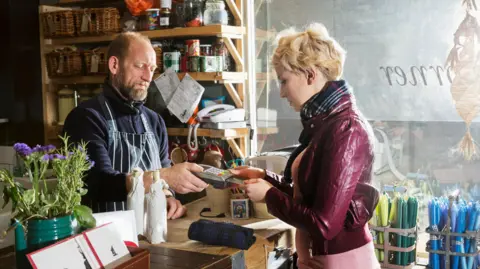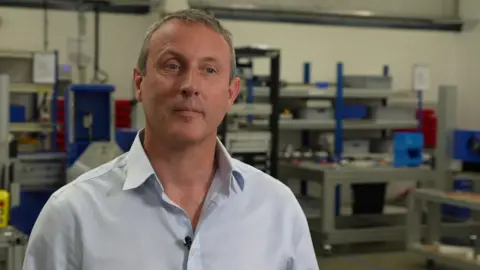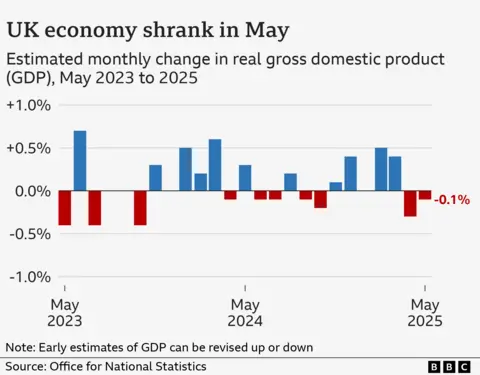Reeves disappointed after economy unexpectedly shrinks
 Getty Images
Getty ImagesChancellor Rachel Reeves has called the latest figures on the economy "disappointing" after the UK economy shrank unexpectedly in May.
The economy contracted by 0.1%, the Office for National Statistics (ONS) said, after also shrinking in April.
The fall in economic output, which confounded analysts who had expected to see slight growth, was mainly driven by a drop in manufacturing, the ONS said, while retail sales were "very weak".
The weaker than expected figure adds pressure on the government which has made boosting economic growth a key priority.
Reeves said: "While today's figures are disappointing, I am determined to kickstart economic growth".
"Getting more money in people's pockets is my number one mission," she added.
But Conservative shadow chancellor Mel Stride said: "Thanks to Labour's reckless choices the economy actually shrank in May."
This puts more pressure on the government to raise taxes in the autumn, he said, while government U-turns on cuts to the winter fuel allowance and welfare benefits "have created a ticking tax timebomb," he said.
Liberal Democrat Treasury spokesperson Daisy Cooper said the figures put "storm clouds over the heads of many hardworking business owners and workers who have been rocked by the mistakes of this government".
The contraction in the economy in both April and May shows the outlook for growth "remains fragile", said Hailey Low, associate economist National Institute of Economic and Social Research.
The government's U-turns on spending cuts have eroded the financial buffer it has to cope with economic shocks, she said.
With businesses scaling back hiring intentions after wage and tax rises, and "strained" public finances, prospects for growth "remain muted in the medium term" Ms Low said.
Reeves faces "hard trade-offs" in her Budget in the autumn, "having to raise taxes or cut spending to meet her self imposed rules", she added.
'We're continuing to grow'

The economy, is "tough" at the moment, with "high inflation and high interest rates", says Mick Crosthwaite, chief executive of veterinary imaging firm Hallmarq.
However, he says the firm is "doing well" because it is export driven.
"There's no doubt that we're in an unstable environment, geopolitically with tariffs, and taxes increasing in the UK, but as an innovative business that's exporting throughout the world, we're able to continue to grow," he says.
He adds that the business exports to 26 countries around the world, so "we're not tied just to the UK economy".

Monthly figures on economic output can be volatile, and a more closely-watched quarterly figure will be published next month.
The main drag on the economy in May was from production, which includes manufacturing.
Oil and gas extraction was lower in the month, while car-making and the "often erratic" pharmaceutical industry were weaker, the ONS said.
The services sector grew overall in May, with legal firms recovering from the impact of changes to stamp duty thresholds the previous month.
But falls in construction and manufacturing outweighed services gains.
In the first three months of the year, the economy grew by 0.7%. During this period it had been boosted by exports as manufacturers raced to beat higher US import taxes, and as homebuyers rushed to complete purchases before the expiry of the stamp duty tax break.
This stronger activity earlier in the year meant that, despite May's contraction, the economy grew by 0.5% in the March-to-May period compared with the previous three months.
Lindsay James, investment strategist at Quilter, said a "spotlight has been well and truly shone on the UK economy in the past week or so".
She said spending cuts had been "nigh on impossible to enact" and said the report this week from the government forecaster, the Office for Budget Responsibility (OBR), on fiscal risks had been "sobering".
On Tuesday, the OBR said the UK's public finances were in a "relatively vulnerable position".
Reverses to planned spending cuts on welfare and the winter fuel allowance, plus backtracking on tax rises, have contributed to a continued rise in public debt, it said.

Sign up for our Politics Essential newsletter to read top political analysis, gain insight from across the UK and stay up to speed with the big moments. It'll be delivered straight to your inbox every weekday.
